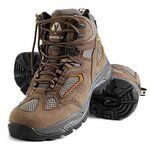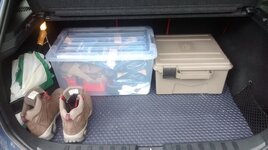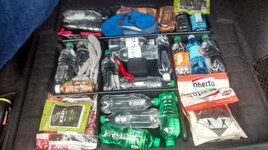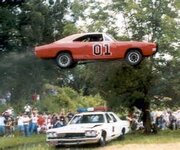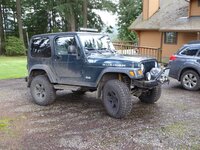- Messages
- 839
- Reactions
- 1,746
I was thinking about what I'd do to get home in a particular disaster scenario, like I often do, and suddenly a light came on. I thought I'd present it to other forum members in a fun sort of way to get us thinking. I'll reveal what my revelation was in a few days, but first I would like to know how others think they may solve the same problem and what ideas you all have about Survival: So Simple it's Profound.
Imagine you're driving home through Oregon or Washington on I-5 when the "Big One" hits, a full-margin rupture of the Cascadia Subduction Zone causing a 9.0+ earthquake. Once the shaking stops you realize that it's time to move while you still can to try and reduce the number of miles between yourself and your home where you have resources and shelter. While others sit in awe, you begin to drive even if it means using the shoulder; the traffic situation isn't going to improve, but rather worsen.
You get about 10 miles before vehicles completely block the highway. The only path available is across the meridian to the empty freeway leading back the way you came, but that won't help complete the mission: to get home. The closest major off ramp is 20 miles back and you have no idea what lies in the opposing lanes beyond where you were when the quake occurred. You decide the best option is to explore finding a way to continue forward.
You exit your vehicle and speak with a truck driver who is on his CB radio. He shares that an overpass is completely collapsed and entirely blocking the freeway and it's shoulders around the corner about 3/4 mile ahead; traffic is blocked in both directions. You realize that you may ultimately end up walking home, but the immediate goal here is to get past this obstacle and continue reducing the number of miles you will need to cover on foot. You walk for 15 minutes and confirm what the truck driver told you: an overpass completely blocks the freeway and traffic is stopped in both directions. There are dozens of other drivers like you staring at the scene and wondering what to do next. How will you get around this obstacle since driving around is not an option even in your jacked-up, locker-and-winch-equipped, mil-spec, go-"anywhere", bad-boy, Tapout sticker-sporting pickup truck, much less my Honda CR-V?
While considering possible solutions to this particular problem, please feel free to share any other ideas that you may have about survival that are so simple and outside-the-box, they're profound. Have fun, but please keep it reality-based.
Imagine you're driving home through Oregon or Washington on I-5 when the "Big One" hits, a full-margin rupture of the Cascadia Subduction Zone causing a 9.0+ earthquake. Once the shaking stops you realize that it's time to move while you still can to try and reduce the number of miles between yourself and your home where you have resources and shelter. While others sit in awe, you begin to drive even if it means using the shoulder; the traffic situation isn't going to improve, but rather worsen.
You get about 10 miles before vehicles completely block the highway. The only path available is across the meridian to the empty freeway leading back the way you came, but that won't help complete the mission: to get home. The closest major off ramp is 20 miles back and you have no idea what lies in the opposing lanes beyond where you were when the quake occurred. You decide the best option is to explore finding a way to continue forward.
You exit your vehicle and speak with a truck driver who is on his CB radio. He shares that an overpass is completely collapsed and entirely blocking the freeway and it's shoulders around the corner about 3/4 mile ahead; traffic is blocked in both directions. You realize that you may ultimately end up walking home, but the immediate goal here is to get past this obstacle and continue reducing the number of miles you will need to cover on foot. You walk for 15 minutes and confirm what the truck driver told you: an overpass completely blocks the freeway and traffic is stopped in both directions. There are dozens of other drivers like you staring at the scene and wondering what to do next. How will you get around this obstacle since driving around is not an option even in your jacked-up, locker-and-winch-equipped, mil-spec, go-"anywhere", bad-boy, Tapout sticker-sporting pickup truck, much less my Honda CR-V?
While considering possible solutions to this particular problem, please feel free to share any other ideas that you may have about survival that are so simple and outside-the-box, they're profound. Have fun, but please keep it reality-based.






